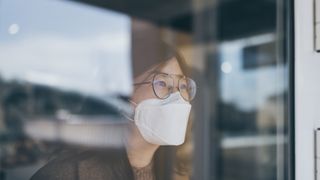Do HEPA filters remove viruses?
Do HEPA filters remove viruses and what's the science behind it?

With the COVID-19 pandemic turning our lives upside down, it's no surprise if you've thought more about the air around you. But what can we do to improve it do HEPA filters remove viruses (opens in new tab) for good? Here, we find out.
Did you know that the level of some airborne pollutants in your house is twice the amount of that outdoors, according to the Environmental Protection Agency (EPA (opens in new tab))? If you have allergies, aside from avoiding external triggers, you also need to eliminate indoor airborne allergens intentionally.
The use of a high-efficiency particulate air filter (HEPA) may be what you need to remove indoor dust, pet dander, mold, and other airborne particles responsible for respiratory allergies or exacerbation of asthmatic attacks. This type of filter is typically found in the best air purifiers (opens in new tab), but not all of them.
But what are HEPA filters, and why are they necessary? Live Science asked primary care physician, Dr. Christopher Oseh to explain all.
What are HEPA filters?
HEPA filters, which is an abbreviation for high-efficiency particulate air filters, are mechanical filters designed to remove airborne particles such as microorganisms, dust, pollen, and pet dander in a room. HEPA filters aim to improve the air quality by featuring a mesh screen and high-density filter to trap airborne particles. These HEPA filters can eliminate airborne particles as small as 0.3 microns in size, according to the EPA (opens in new tab).
HEPA filters come in a range of sizes and capacities, so it's essential to buy a filter that has the ability to filter the air in a particular room's size.
Some air purifiers have in-built HEPA filters and have an additional filtering capacity to improve the quality of air distributed in a room, unlike those without HEPA filters.
In order to optimize the efficiency of HEPA filters, the mechanical filters require periodic cleaning or replacement to function maximally. Cleaning or replacing HEPA filters should be done more often during allergy seasons with high pollen counts and airborne particles. During the rest of the year, they can be cleaned or replaced quarterly.

Do HEPA filters remove viruses completely?
Few research studies have shown that HEPA filters can remove viruses in the air entirely but there are instances where they may help. Contagious viruses that cause respiratory diseases may be airborne directly or enclosed within respiratory droplets released when an infectious person coughs or sneezes. When viruses are within droplets, the size of the airborne droplets is larger and easier to be removed by HEPA filters.
A study from the University of Castilla-La Mancha (opens in new tab) revealed the efficacy of HEPA filters in removing aerosols containing the COVID-19 virus. The researchers discovered that HEPA filters added to an air-purifying system filtered aerosols laden with the virus. Though, it's very important to note that the sample size of this study was relatively small to be statistically significant. This shows that more extensive studies using a large sample size are required to make a conclusion on the role of HEPA filters in removing non-aerosolized viruses and we would not recommend ever relying on this method to attempt to remove COVID-19 from an environment.
Do HEPA filters help with allergies?
HEPA filters reduce the frequency of allergens and provide symptom relief by removing particles in indoor air that are triggers for allergies (opens in new tab) in susceptible individuals.
HEPA filters are ideal for respiratory allergies such as mold, pollen, dust, and pet dander because these allergens are airborne. HEPA filters aid the removal of these respiratory allergens from the air and improve indoor air quality.
A research study conducted to ascertain the efficacy of air purifiers with HEPA filters (opens in new tab) showed a significant improvement of allergic rhinitis symptoms among participants. The HEPA filters in the air purifiers effectively reduced the concentration of house dust mites and particulate matter allergens, which are one of the primary causative agents in allergic rhinitis.

How to choose HEPA filters
Before you purchase a HEPA filter, consider the type of particles you want to eliminate in your room, the size of your room, and the clean air delivery rate (CADR).
If you intend to filter smaller air particles, ensure the HEPA filter has the capacity to filter particles in micro and nano sizes. If you have a big room, select HEPA filters with higher clean air delivery rates because of their ability to filter a more significant proportion of air.
The verdict
There are limited conclusive research studies on HEPA filters capacity to remove viruses. Still, a few studies revealed that HEPA filters are capable of removing some droplet-enclosed viruses and those with a diameter larger than the mesh pores in HEPA filters. Extensive studies still need to be carried out, however, before it would be safe to recommend using a HEPA filter to protect against airborne viruses.
HEPA filters, however, can help to remove indoor allergens responsible for respiratory allergies, so they are helpful at home or in offices to improve the quality of indoor air distribution and provide a better environment for allergen susceptible people to stay.
With all of that in mind, it's crucial you choose an air purifier that is large enough for the room that you want to use it in. Having a purifier that's too small will be of little use.
Live Science newsletter
Stay up to date on the latest science news by signing up for our Essentials newsletter.
Dr. Christopher Oseh is an experienced primary care physician, health blogger, content marketing professional, and self-published author. He specializes in creating content for health care providers and health technology companies. He has been featured on Harvard Medical school blog and has also created content for a variety of health technology clients.
